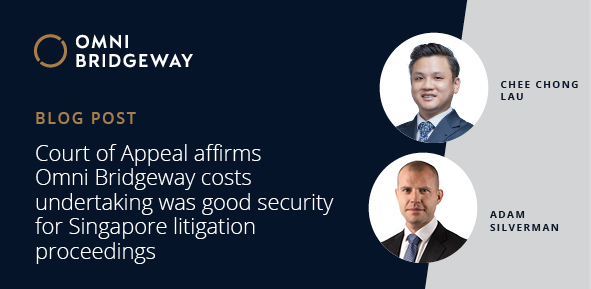Court of Appeal affirms Omni Bridgeway cost undertaking was good security for Singapore litigation proceedings

- Authors:
- Adam Silverman
- Investment Manager - Singapore
- Chee Chong Lau
- Investment Manager, Senior Legal Counsel - Singapore
The Singapore Court of Appeal[1] has upheld a decision by the Singapore High Court[2] that a costs undertaking given by Omni Bridgeway was an adequate form of security for costs. The High Court decision was the first time a Singapore court has permitted a litigation funder to provide a costs undertaking as security. The Court of Appeal’s endorsement of the decision is another example of the Singapore judiciary’s continuing acceptance of third party dispute finance for court proceedings.
Background
Omni Bridgeway is funding insolvency claims in the Singapore High Court against the founder/director and auditor of a Singapore group of companies. The proceedings have been brought by the liquidators of the companies. The founder/director, Ms Olivia Lum, sought security for her costs up until the filing and/or exchange of affidavits of evidence-in-chief in the sum of SGD 90,000. The parties agreed the amount of security to be provided but could not agree on the form of security.
The liquidators maintained that a costs undertaking by two companies in the Omni Bridgeway group of companies would be a satisfactory security arrangement. The undertaking would be jointly made by Omni Bridgeway Limited, a company listed on the Australian Securities Exchange, and its Singapore-incorporated subsidiary, Omni Bridgeway (Singapore) Pte Ltd (the Omni Undertaking). Ms Lum argued that the Omni Undertaking was plainly inadequate.
The issue was considered by a court registrar who said that a payment into court would need to be provided if the parties could not agree that the security be made by either the Omni Undertaking, a banker’s guarantee or a solicitor’s undertaking, on terms satisfactory to Ms Lum. The liquidators appealed the registrar’s order.
High Court decision
The Singapore High Court allowed the appeal. The court accepted the Omni Undertaking as an adequate form of security for costs. The court’s reasons included that:
- The Omni Undertaking was an irrevocable and unconditional promise to pay any costs order up to the agreed amount of security. This made it “akin to a bank guarantee” provided it could be shown the Omni companies had the means to pay.
- The High Court was satisfied the Omni companies had sufficient assets to satisfy such a costs order which was a small fraction of their net assets.
- There was little to no risk of the Omni companies not honouring the undertaking because of the substantial reputational damage they would suffer in not doing so.
- In any event, Ms Lum could enforce the Omni Undertaking easily. She would have immediate recourse against the Singapore based company. However, even if Ms Lum had to go against the Australian parent company, it was clear that Singapore judgments can be enforced in Australia with relative ease.
Ms Lum appealed to the Court of Appeal.
Court of Appeal decision
The Court of Appeal dismissed the appeal. The appeal court did not assess the merits of the High Court’s decision, ie that the Omni Undertaking was adequate security, as this was outside the scope of the appeal. However, the Court of Appeal considered and endorsed the principles applied by the lower court, including that:
There is no default expectation that security will take the form of money paid into court, a solicitor’s undertaking or a bank guarantee. A plaintiff can offer any form of security that is workable.
The court’s inquiry is not whether the proposed form is worse than cash or any other “conventional” security, but whether it has the characteristics of a fund or asset against which a successful defendant can readily enforce an order for costs against the plaintiff.
The factors that a court will assess are case specific, depending entirely on the circumstances of each particular case. This means that in each case the court’s inquiry into the adequacy of the form of security depends on the evidence provided and the court will weigh the evidence accordingly.
The Court of Appeal also confirmed the court’s wide discretion to order security in any form that it deems fit. The court should not be closed to alternative forms of security and, in today’s contemporary litigation landscape, should expect forms that are “reflective of the times”.
In reaching its decision, the Court of Appeal relied on Australian and English case law. These included Australian cases where the court allowed security to be furnished by way of an undertaking by a litigation funder, coupled with a payment into court for the purposes of enforcement, if needed.
Implications
The Court of Appeal’s decision highlights the wide discretion on the forms of security for costs that a Singapore court may accept. It also reinforces the Singapore judiciary’s continuing acceptance of and broad support for dispute finance for court proceedings and the important role it plays in assisting plaintiffs to bring meritorious claims.